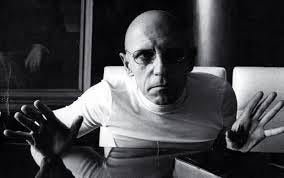As we reach the midpoint of Pride Month, I want to continue examining the kinds of heroes upheld by the modern sex philosophy. My purpose isn’t to shock or offend, but to expose a deeper truth: this philosophy cannot free you from your greatest problem. It teaches that the good life is one in which you are “authentic” to your sexual desires. But in reality, that’s not freedom, it’s the loss of freedom. It’s a life of captivity to sin, dressed up as liberation. It offers no hope of self-control, no path to discipline, and no vision of redemption. Just the tyranny of impulse masquerading as truth.
The Greatest LGBTQ+ Philosopher
The most quoted thinker of our age isn’t a scientist, theologian, or statesman—but a man who justified self-indulgence and moral chaos.
Michel Foucault is the most quoted scholar of the last fifty years across the board.
Let that sink in.
Not a cancer researcher.
Not a peacemaker who ended a global conflict.
Not an economist who solved the national debt.
Not even a liberal theologian like Martin Luther King Jr.
Nope. The guy modern humanities professors admire most, as calculated by citations, is the one who told them that all moral standards are relative. Truth, according to Foucault, is nothing more than a function of power. Whoever is in power gets to define what is “true,” what counts as “mental illness,” and what is and is not “moral.”
He taught this because he believed that nothing is transcendent—all is immanent. He begins with man as the measure of all things. As a result, he loses “man” in the process. Hhe traced the history of concepts like madness and criminality to show how differently they are understood across cultures. The point being: humans believe they are dealing with objective moral truths, when in fact they are only operating out of cultural assumptions.
Hopefully you can see how this applies today. Gender? Well, that’s a cultural construct. Sexual morality? Same thing. In fact, you can say “cultural construct” after just about anything and you’ll get Foucault’s approval—much like the bit from Parks and Rec where anything can send you to jail. Believe it or not, this sex philosophy leads to sin jail every time.
“But wait,” you say, “that’s the kind of teenage nonsense we grow out of! Eventually, we learn to reason, test ideas, and discover objective moral standards that help us live well. We learn to control ourselves and have dispcline over our impulses.”
Yes, we should. But in today’s academy? That phase never ended.
Foucault’s entire philosophy is self-referentially absurd. That means if you apply its own standards to itself, it cannot be true. It’s one of the lowest hurdles a philosophy should be able to clear—like running half a mile for a physical exam. If a system of thought can’t pass the “don’t refute yourself” test, then it has nothing meaningful to offer. And yet, this is the foundation of much of modern academia.
In fact, entire departments of the humanities—philosophy, literature, sociology, gender studies—are built on this stuff. You’ll hear the echoes of Foucault’s chant in faculty meetings:
“Truth is determined by power!”
“You’re saying that Foucault view is only true because of the power he weilds in the academy?”
But here’s the darker part of the story. Foucault didn’t develop these ideas in a vacuous Platonic realm, disconnected from his own life. He lived them.
He rejected God and the moral law—and indulged every twisted impulse he could justify.
He sought out anonymous encounters with strangers in public parks, often without even seeing their faces. He even engaged in sadomasochistic sex in public spaces.
He contracted AIDS.
And there are public testimonies—although contested—that he knowingly infected others.
This is the man the modern university quotes more than any other. They consider him a hero.
Why?
Because Foucault gave them an excuse.
He told them what they wanted to hear:
There is no moral law above you. There is no God. You are free to define your own truth. Just get enough power.
This isn’t new. It’s the same philosophy as Nietzsche. And before Nietzsche, it was Thrasymachus in Plato’s Republic, Book 1:
Justice is nothing more than the advantage of the stronger.
And before that, it was the serpent in the Garden of Eden: you can be your own God.
That view is easily refuted by reason, by moral reality, and by the clear revelation of God. But it still finds disciples, because it promises something seductive: the illusion of autonomy without accountability.
Morality is merely a power play.
Sex, and definitions of gender, are culturally relative and reducible to power structures.
We don’t know what a “woman” is because there is no objective standard by which to define that term. It is whatever a person thinks it is. Man can’t be the measure of all things because we don’t know what a man is, or what a measure is, or what is is.
So here we are.
On one side, Foucault—the prophet of self-indulgence, chaos, and power-worship.
On the other, the God who made you, who loves you, and who calls you to the good through Christ, the true Light of the world.
You can’t straddle that line forever.
You will follow one voice or the other.
And only one leads to life.
The other leads to slavery in sin.
Foucault couldn’t even help himself. He was a slave to the most unnatural sins. He cannot offer you anything.






Foucault attracts disciples of the resentful type.
Lest we forget, what he he was doing in Algeria as well as what he signed on to in the ‘70s regarding abolishing age of consent laws.
Thank you for this necessary refresher for me.